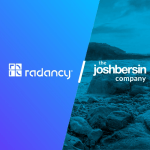Enterprise talent leaders are grappling with intense pressure. 64% of HR professionals say finding qualified talent has become harder, reflecting ongoing labor shortages and rising skill mismatches. Meanwhile, 81% of HR leaders report feeling burned out, underscoring the demand for smarter, more efficient hiring processes. CEOs expect speed and agility – and CFOs expect measurable return. Fragmented systems and reactive approaches simply can’t keep pace.
Moving Beyond Reaction: The Rise of Predictive Hiring
Traditional talent acquisition models respond only after roles are open. Predictive hiring flips that by enabling anticipation, using data and AI to forecast future hiring needs and build robust pipelines proactively. The results speak for themselves:
- 25% improvement in time to hire
- 30% reduction in cost per hire
- 459% improved ROI
These gains explain why 61% of CHROs planned to invest in AI to streamline HR in 2024. But adoption remains emerging – few teams call themselves “AI mature.” This gap creates a strategic window.
Leadership Pressures Predictive Hiring Can Address
- Time-to-slate targets
VPs of talent acquisition must deliver qualified shortlists faster. AI systems compress sourcing and screening noise by surfacing the right candidates first. - Tech fragmentation and blind spots
Juggling separate tools means mismatched data. Predictive platforms unify sourcing, CRM outreach and performance analytics in a single, coherent pipeline. - Proof of ROI from the C-suite
57% of buyers expect ROI within three months of purchase – talent acquisition systems are no exception. Predictive hiring gives talent acquisition leaders clear attribution and outcomes, calibrating spend with impact.
What Predictive Platforms Look Like in Practice
Here’s how predictive hiring takes shape in real-world settings:
- Forecasting and planning: Anticipate hiring peaks, map key roles, model baseline activity and project channel contributions.
- Unified performance analytics: See conversions, costs and contribution across job boards, Career Sites, Employee Referrals, CRM and Hiring Events.
- Precision sourcing: Target CRM segments and external audiences using behavior and profile signals, ensuring outreach is data-driven.
- Internal mobility: Surface employees who can grow into critical roles, boosting retention and agility with less external spend.
→ Move from reactive to strategic talent acquisition.
Read Next-Gen Talent Acquisition and see how Agentic AI and simplified hiring drive smarter, faster results.
Why the Radancy Talent Acquisition Cloud Stands Out
Radancy brings these predictive capabilities to life in a connected, AI-powered platform built for enterprise scale:
- Goals and Forecasting Engine
Defines hiring goals and timelines; the system forecasts application volume and optimal channel mix, then suggests real-time adjustments. - Cross-Channel Analytics Dashboard
View job analytics, media performance metrics, email campaign performance and more – updated daily for concise decision making. - AI-Driven CRM Audience Targeting
Use AI to build, score and engage talent segments – such as silver-medalist applicants or internal career-path candidates – cutting outreach time dramatically. - Internal Mobility Insights
Map skills and employee data to open roles, enabling internal hires who stay longer.
The ROI: accelerated results, better matches, reduced costs – while empowering recruiters to focus on relationships, not data entry.
Talent Acquisition Trends That Amplify Predictive Hiring
- Skills-first hiring is mainstream – almost two-thirds of firms now use it. Predictive systems help match by skills more agilely, both internally and externally.
- Internal mobility is more strategic than ever. Embedding it in talent acquisition processes connects talent to opportunity and improves retention.
- Responsible AI is a business requirement. Leadership demands systems that augment rather than replace human judgment, reduce bias and elevate decision making.
Conclusion: Talent Acquisition’s Strategic Transformation Starts Now
Predictive hiring isn’t a nice-to-have – it’s emerging as talent acquisition’s engine for 2025 and beyond. By forecasting needs, optimizing channels and mobilizing talent within and outside, predictive systems move hiring from reactive to strategic.
Solutions like the Radancy Talent Acquisition Cloud show us the art of the possible: more efficient, more impactful, more human. For talent acquisition leaders, the choice is to step into the future or risk falling behind.
In a world where speed, quality and ROI matter, predictive hiring is essential.
See how Radancy’s AI platform simplifies hiring, reduces costs and builds the workforce of tomorrow. From predictive insights to intelligent automation, our single, connected platform transforms how enterprises attract, engage and hire talent.
Book a demo and discover how Radancy can help your organization deliver the future of talent acquisition.
- How Predictive Hiring Turns Talent Acquisition Into a Strategic Powerhouse - October 16, 2025
- Data-Driven Recruitment in the Age of AI: Hire Faster, Smarter and Without the Noise - August 13, 2025
- How AI in Talent Acquisition Improves Candidate Experience - July 16, 2025
- Hiring in the Age of AI Spam: How to Find Real Talent Again - July 8, 2025
- How to Adapt to the New Recruiting Norms of 2025 - May 23, 2025
- What is Programmatic Recruitment Advertising? - February 13, 2025











